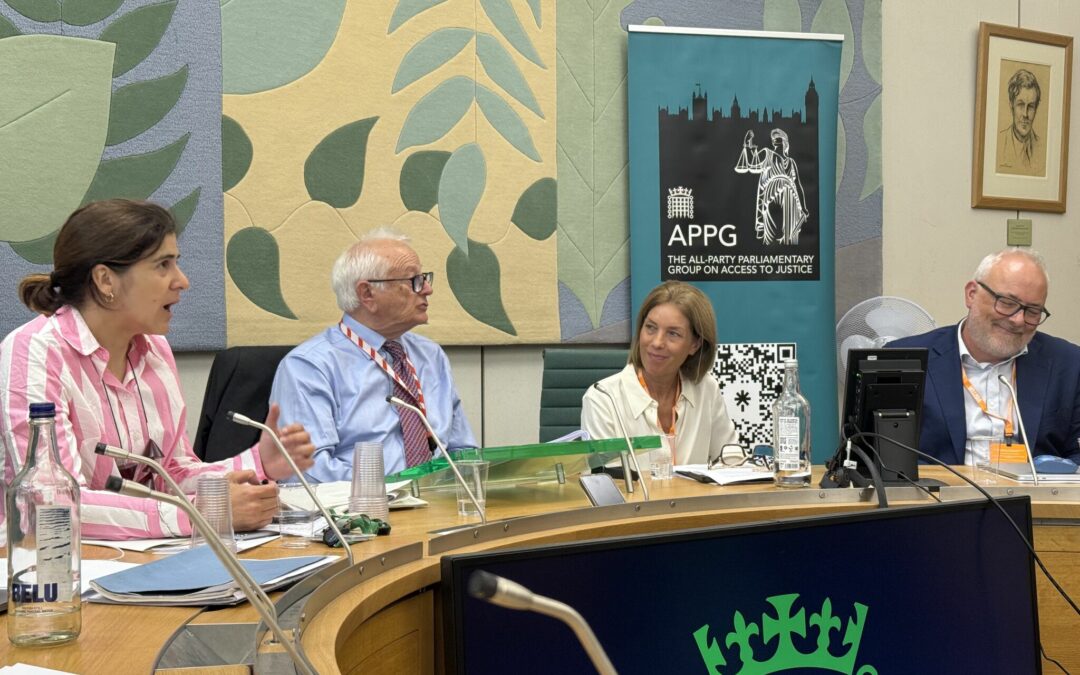Earlier this summer, Jenny Beck KC (Hon) sat on a panel in parliament alongside the Sarah Sackman KC MP, Minister for Courts and Legal Services. The event, run by the All Party Parliamentary Group on Access to Justice, focused on court backlogs and the impacts of the cyber-attack on the Legal Aid Agency.
Below is the transcript of Jenny’s contribution, which outlines the pressures faced by firms and practitioners, and the impact on clients:
I’m going to talk a little bit about the breach, the impact of the data breach and the consequences for practitioners and, of course, automatically for clients and what been done to the confidence in the system and why I’m so worried about this in terms of the sustainability. And particularly as a family law specialising in assisting women seeking protection orders against domestic abuse, the impact of that breach on survivors of VAWG.
The data breach directly means we have got less capacity to help vulnerable people. It is as simple as that. It reduces the time we take to look after clients. It undermines the chances of survival for firms. It increases staff attrition. It erodes trust. And it undermines the fragile support network operating for victim support survivors.
Family lawyers play a key role in supporting the government’s strategy to half VAWG in 10 years, now nine years. They secure critical protection orders in order to prevent abuse against women and children. They fight to keep arrangements for children to spend time with both their parents safe. They challenge the use of the court system to abuse. And inevitably, a lot of this work is done under legal aid for a low fixed fee.
Now whilst other areas of legal aid have been promised a long overdue and probably insufficient increase, we’re waiting to see some critical investment in family law. I hope that that will follow. And again, that is something which causes me enormous anxiety because the only reason family legal aid law survives is because some of the work can be done privately and firms cross-subsidise. On its own, family legal aid is entirely unsustainable.
I think the data breach could be the final straw for a lot of family practitioners and I will explain why. The fact that a system failure like that has had such an impact indicates the economic fragility of the discipline in general. The emergency protection work, which is a real lifeline to millions of women, is so poorly paid there is simply no give left in the system at all.
So done properly, securing a non-molestation order, which is a protection order, is effectively loss-making. The fixed fee is small and if you divide that by the number of hours which it takes to properly secure one of those orders, you are working at about £30 an hour and it costs on average £60 an hour to employ a qualified solicitor who is able and trained and understands trauma well enough to actually be able to do the job properly – it’s already a complete loss leader.
Committed firms do it because they recognise that domestic abuse is of course a fundamental breach of human rights and they try to make sure they can help tackle it by subsidising from other areas of family law and private work. On its own, it simply does not work. In addition to that, of course, they invest in systems and processes to help them manage the risk of the tiny, tiny profit margins or indeed negative loss-making pieces of work.
And those systems reduce the cost of the bureaucracy; they help run cases efficiently; they secure the management information that is needed for firms to keep going and properly plan and help maintain their fragile cash flow. Now those fragile systems have of course to be built around the Legal Aid Agency’s system and so they are all constructed around CCMS. They use it in order to inform how we run our firms, so it is key to everything that we do. The inadequacy of the current data breach and the contingency arrangements is likely to be the final straw for many, and that’s not an exaggeration.
I want to quickly explain what I mean by exploring the additional time and costs front end for pursuing an application itself and then I want to look very briefly at the back end and the contingency arrangements for how we are paid and why that is causing chaos.
In relation to applications and case progression, in lieu of a functional system around which all of our systems are based, processes need to go back to being done by paper or by the telephone. There are no contingency arrangements to properly record or reimburse for that additional work. All of the work done will ultimately need to be uploaded onto the system once it is functional again. The cost assessment guidance prohibits payment for this administrative work, this doubling up of administrative work, and there is simply no give to afford that extra cost.
I have worked out, on a relatively forensic analysis of a number of cases, that it has taken two to three hours extra for a very simple case, a simple non-molestation order case. Here is a very quick worked example:
a woman comes to see us fleeing domestic abuse seeking a protection order. We can delegate powers to represent her straight away, but we cannot submit anything on CCMS. We have to complete a financial assessment, prepare file notes, or complete a draft paper application. All of this is going to take an approximate extra half an hour (and every merit application is another half an hour). We obtain an injunction, the matter is contested, which is very common. We have to delegate again to comply with the court directions, again another paper application. We then have to have a couple of disbursements, usually process service fees, possibly police disclosure.
If you add all of those things up, you will end up with a couple of extra hours before you have got any level of complexity at all in the case. If you do 15 of those a week, which we sometimes do but at the moment cannot do, it will add up to an additional 30 to 40 hours a week. In other words, the equivalent cost of an entire caseworker solicitor in our firm is used every single week and has been since the middle of May just to deal with processing the applications without us being paid.
We cannot bear that burden and as a result it means we are able to see less clients, so it is having a direct effect on clients. It also means we are less profitable for the clients that we do see because we can’t charge for the work, we cannot time record it, we do not escape the fixed fee. We are weighed down with more bureaucracy and that undermines the morale of my team who work really long hours to save people’s lives. Morale is further undermined by every piece of work we’re doing being at risk and the erosion of trust with the Legal Aid Agency and poor past decision making is leaving people worried that they might not get paid for things that they’re doing at risk once there is a functional system back up and running.
In relation to the payment side of things, once we have got the cases through, the Legal Aid Agency’s contingency arrangements have been time consuming and inaccurate. For every single week that we have put in a contingency fee arrangement, we have not once received the amount of money we asked for. It has either been under or over which leaves it very difficult for us to financially plan.
This is because of human error, but there are no backup systems, and we cannot work out what’s happening, and we are having to spend huge amounts of hours understanding it. For example, just last week were overpaid again, so we did another deep dive into why. We ascertained that the Legal Aid Agency caseworker had added the example equation included at the top of their training documents, onto our fee. It took a long time to work that out. Had we accepted it, we would have been having to pay it back later which would have only generated further complications.
We cannot run our firm: we have no management information because we cannot post anything against a real file because there are no real files; we have no accurate reading of how our staff are performing because we cannot rely on any sensible data; we cannot reassure our banks because they can only see our management accounts which do not have any proper payments in them. We have nothing to rely on to quell the mounting anxiety we have when we are managing a legal aid practise.
We live in a state of high anxiety, as you will imagine. So now we can both claim disbursements and profit costs. The position on VAT remains unclear and, like us, suppliers are understandably getting fed up and anxious. The margins are too unforgiving for the sorts of leaps of faith that we’re being asked to give.

Jenny is a founding director and an award-winning family lawyer committed to accessible justice and the rights of the individual. She specialises in complex financial disputes and helping resolve arrangements for children.
She is an accredited Resolution specialist and an Advanced Family Law Panel member. In 2021 Jenny was made an Honorary Kings Counsel (KC Honoris Causa) in recognition of her contribution to changing the law of England and Wales


Recent Comments